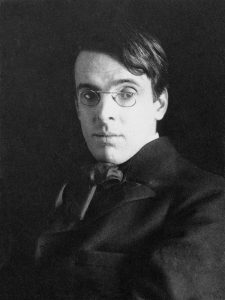Richmond Read-along 44

Welcome back to the Richmond Read-along! Today’s poem is from W. B. Yeats. Yeats is known as one of the most famous Irish poets of the twentieth century. Despite spending much of his life in England, he took a keen if inconsistent interest in Irish politics, probably spurred on by his long, unreciprocated romantic obsession with Maud Gonne. Much of his poetry is inspired by Irish folklore and mythology, although as he matured he consciously developed his style to be less romantic and allegorical and more materialist and precise. His poems also express his views on Irish nationalism and political events at the time Ireland secceded from the UK, inextricably linking Yeats to the history of an independant Ireland. This link was consolidated when Yeats was appointed to the Irish senate, although he ended up disillusioned by democracy and showed tendencies that leaned towards facism in his later life.
His immense collection of poetry is still widely read and studied today, both for his political links and on its own merit. Bridging the Romanticism of the nineteenth century and the modernism of the twentieth, though never fully embracing the latter, his poetic style and influence is as historically important as its often political content. Though he changed his style, his verse remained accomplished and celebrated throughout his life, leading to the award of the Nobel prize for literature in 1923.
Today we are reading “The Song of Wandering Aengus:”
“I went out to the hazel wood,
Because a fire was in my head,
And cut and peeled a hazel wand,
And hooked a berry to a thread;
And when white moths were on the wing,
And moth-like stars were flickering out,
I dropped the berry in a stream
And caught a little silver trout.
When I had laid it on the floor
I went to blow the fire a-flame,
But something rustled on the floor,
And someone called me by my name:
It had become a glimmering girl
With apple blossom in her hair
Who called me by my name and ran
And faded through the brightening air.
Though I am old with wandering
Through hollow lands and hilly lands,
I will find out where she has gone,
And kiss her lips and take her hands;
And walk among long dappled grass,
And pluck till time and times are done,
The silver apples of the moon,
The golden apples of the sun.”
You can find this poem online at The Poetry Foundation. Members of Richmond upon Thames Libraries can read more about Yeats in the Oxford Dictionary of National Biography online.
Join us tomorrow for the next Richmond Read-along!
